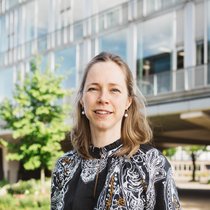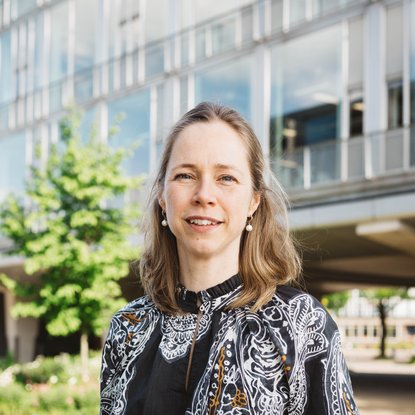Walk into the AMS Institute building and you'll witness something remarkable: a bustling ecosystem where theoretical knowledge meets practical application, where PhD students collaborate with civil servants, and where the city's most pressing challenges become the catalyst for groundbreaking research.
This dynamic ecosystem embodies the institute's mission of connecting science with society, all with the goal of safeguarding and shaping a vibrant city. AMS Institute's Scientific Director Eveline van Leeuwen explains how this collaborative approach is transforming urban innovation.
Any first-time visitor entering the AMS Institute’s building senses that this is not a typical research institution. Glass-encased rooms host meetings among not just students, researchers, and Principal Investigators (Lead (associate) professors). Public utilities, civil servants, and program developers convene with startup founders. The maker's lab buzzes with activity. Living labs test solutions to the city's pressing challenges.
This dynamic environment embodies Scientific Director Eveline van Leeuwen's vision of what urban innovation should look like. "We come from all disciplines: engineering, urban studies and planning, IT, environmental sciences, geoscience, law, communication, computer science… all under one roof.”
Bringing together different types of knowledge is the Institute’s signature approach to transcending academic theory to environmental and societal change for residents in the real world.
Gerda Feunekes and Eveline van Leeuwen
Building bridges across disciplines
"Climate challenges connect to social equity, green energy links to housing, and mobility impacts health. Instead of trying to solve problems separately, we recognise how intertwined the issues are," van Leeuwen explains. "When different types of knowledge convene here - from academia, the municipality, and citizens - we identify the most effective points for change, and that has created some fascinating and unusual collaborations."
Since becoming Scientific Director in 2020, van Leeuwen helped transform how AMS Institute facilitates these connections. "We established at that time a stronger research fellow community as well as regular Principal Investigator meetings that created more opportunities for collaboration," she says.
Soon after Van Leeuwen's arrival, the first Scientific Conference was held online. The first in-person conference in 2024 coincided with the Institute’s 10th anniversary. It brought together the entire network for dynamic panel discussions and workshops, inviting governments and citizens from around the world interested in how science and urban planning function side by side.
It showcased how information flows in both directions: scientists inform the Amsterdam municipality, and the city poses relevant ideas and questions for scientists. This way of working spreads throughout the partner universities and into other topics, creating new, exciting projects.
“Climate challenges connect to social equity, green energy links to housing, and mobility impacts health. Instead of trying to solve problems separately, we recognise how intertwined the issues are.”
Eveline van Leeuwen
Scientific Director
The NWA-ORC proposal for ACT! (Accelerating the Circular Transition) recently received €7.2 million in funding from the NWO. Over the next five years, more than 50 partners from science and society (a repair café, the high-tech industry, local NGOs, and ministries) will envision a systemic transition to a less wasteful, circular society. Societal wellbeing will form the heart of simulation models that urgently seek to reduce the city’s contribution to climate change, biodiversity loss, pollution, and resource scarcity.
Communication and scale
Van Leeuwen, who also serves as Professor and Chair of Urban Economics at Wageningen University & Research, still finds time to supervise student’s research amidst duties such as biweekly meetings with Amsterdam’s Chief Technology Officer and guiding large initiatives funded by the Dutch Research Council. She emphasizes making research and participation accessible, just like her agenda.
"For one, we communicate findings effectively to the public, something traditional institutions might struggle to do," citing visually striking long-read articles on findings and actively contributing to the city’s Open Research portal by a devoted communications team as examples.
Another example is size. AMS avoids the pitfalls of a bureaucratic ivory tower. “We've found our inner structure to be the optimal size - large enough to cultivate meaningful research and create successful strategies, but small enough that people still know each other and can easily connect. That way, our building really can house all activities.”
She recalled a moment of insufficient capacity for the Ideal(s) City project. Suddenly Wageningen master’s and PhD students started working on the data. Then the municipality picked up on its potential to more holistically solve pollution, discrimination, and unattainably high housing prices. “If you have a common goal, and people have the freedom to contribute to it, then things like this really can materialise.”
“You need room to make mistakes and learn from them, together with all partners. That's why we create such a safe space for experimentation.”
Eveline van Leeuwen
Scientific Director
Shaping tomorrow's cities
"We're learning that it takes several years to build the kind of trust networks needed for effective collaboration," van Leeuwen reflects. "You need room to make mistakes and learn from them, together with all partners. That's why we create such a safe space for experimentation."
This role as convenor is evident in the institute's diverse portfolio, from theoretical research on ranking the urgency of Amsterdam’s quay walls in ways that saved the city millions of euros, to practical solutions for waste management. "Having both types of projects creates energy and momentum," van Leeuwen explains. "Researchers can connect their theoretical work to real city challenges, while practical solutions can be enhanced by cutting-edge innovation."
Looking ahead to the institute’s next 10 years, Eveline van Leeuwen and Managing Director Zwanet van Lubek are steering the institute’s future goals with "city shots". These are thematic visions of the future that help to provide a framework for all the initiatives we undertake at the institute. Initiatives on a resilient, regenerative, and just city, but with particular attention to how these affect all people. Solutions should be rolled out “here and now,” but with “elsewhere, later,” in mind: ensuring sustainable policy or intervention in the city should not be at the expense of places elsewhere.
This philosophy shapes how AMS Institute positions itself in Amsterdam's landscape. "We're the meeting point where universities and municipalities come down from their traditional positions, citizens step up with their practical knowledge, and real change happens in the middle."
Ger Baron and Eveline van Leeuwen at the Scientific Conference 2024

